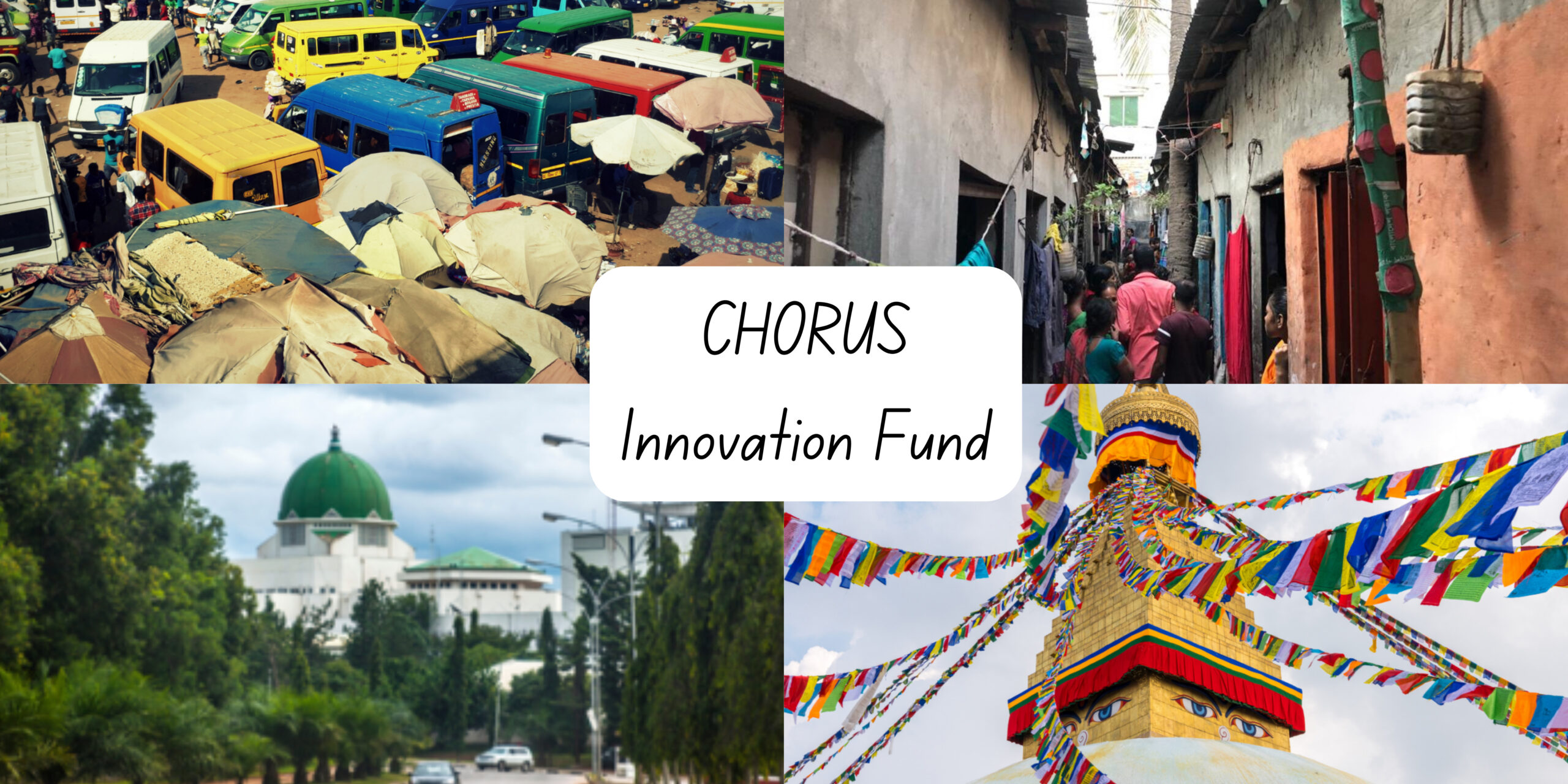
CHORUS Innovation Fund: 9 Innovative Projects
In summer 2022, early and mid-career researchers from across CHORUS were invited to submit research proposals for a first round of funding from the CHORUS Innovation Fund. The fund is for smaller innovative projects that would aim to:
- Extend knowledge in relation to CHORUS 4 pillars
- Explore pillars/features in relation to groups of urban poor residents facing exclusion and discrimination
- Support early- and mid-career LMIC researchers to develop research and leadership skills, particularly encouraging leadership from female LMIC researchers
- Build and extend CHORUS’s links with emerging/new urban health organisations/stakeholders e.g. research, community organisations, local governments, health providers
- Support innovative ideas for research uptake and capacity strengthening interventions and their evaluation
The applications were of a very high standard, and the following 9 projects were awarded funding, after being thoroughly reviewed and scored by a panel of external urban health professionals. The application process really highlighted the breadth of skills, ideas and commitment we have across the CHORUS teams, and we are excited to get these new projects underway.
University of Nigeria

“Identifying and mitigating the impact of urban crimes on the wellbeing of urban dwellers and health facilities”
Charles Tochukwu is a Lecturer in Psychology at the University of Nigeria, specialising in clinical/forensic psychology, behaviour and attitude change, health systems and policy.
Insecurity and crime are reportedly on the increase in Nigeria, impacting general health, economic and political wellbeing of citizens. Urban spaces experience disproportionately high levels of crime, and crime disproportionately affects the most vulnerable, including women, children, youth, minorities and the poor. An in-depth understanding of how urban crimes impact the health and wellbeing of urban residents is needed, as well as how they impact on the health services in poor urban areas. The Basic Health Care provision fund, a recent advancement in improving access and quality of service in primary healthcare facilities in Nigeria, recognizes the problem of crime and dedicates a proportion of funds to help facility managers to provide security services.
This project aims to understand the nature of urban crimes and how they impact service users and health service delivery in urban places in the selected cities of Onitsha and Aba in Nigeria. It also aims to seek community-oriented solutions that can help to secure and strengthen (especially public) health facilities in urban spaces to deal with the challenges of urban crimes. Understanding the connection between urban crime and urban health will yield information for multisectoral collaboration across the stakeholders involved.
 “Assessing the level of multi-sectoral involvement in Water, Sanitation and Hygiene (WASH) for improving health in Urban Poor Settings in Anambra State”.
“Assessing the level of multi-sectoral involvement in Water, Sanitation and Hygiene (WASH) for improving health in Urban Poor Settings in Anambra State”.
Uchenna Ezenwaka is a Research Associate at the Health Policy Research Group, University of Nigeria and specializes in public health, health systems research, health management and medical microbiology.
Nigeria has a high rate of rural-urban migration, and the growth rate of its urban population is projected to reach 59.2% by 2030. However, a higher proportion of people migrating to cities are concentrated in low-income informal settlements; urban poor settings/slums. In these settings, the challenge is usually poor access to basic social amenities such as water, sanitation and hygiene (WASH) services. The effects of the social determinants on health (SDH) are well known and WASH is a primary SDH. Hence, the consequences of poor access to WASH include diseases such as diarrhoea, poor solid waste disposal and inadequate vector control.
This project aims to assess the level of multi-sectoral involvement, and design and implement inclusive community-based participatory interventions for improving access to WASH and health outcomes of the urban poor population towards achieving SDG 6 (ensuring availability and sustainable management of water and sanitation for all) in Anambra State, Nigeria.
 “Social determinants of health seeking of school children in urban areas and implications for the Child Rights Act in Nigeria”
“Social determinants of health seeking of school children in urban areas and implications for the Child Rights Act in Nigeria”
Prince Agwu is a Research Fellow at the Health Policy Research Group, University of Nigeria, and an academic staff in the Department of Social Work, University of Nigeria. He holds a PhD in Social Policy and is a Commonwealth Alumnus of the University of Dundee.
As the voices of children in healthcare are subjected to those of their caregivers and those with power over them, the voices of children in health-related research in Nigeria have been missing. Several evaluative studies on the voices of Nigerian children in decisions that affect them reveal that children’s voices are constrained and poorly represented, and this has been attributed to the lack of enforcement of the Child Rights Act [CRA]. A recent Nigerian study argued that children are underrepresented and marginalized both in health service delivery and health-related studies, despite provisions in the CRA.
This study seeks to understand the social determinants that affect the health seeking behaviours of school children, as well as understand their health seeking/healthcare realities in the context of the law (CRA). The study examines the meaning of healthcare for children, how healthcare is sought by them, and the factors that influence preferred healthcare services for children, whether formal or informal. It also seeks to achieve this understanding through the voices of the children, with triangulated responses from school actors, caregivers, and policymakers. It looks to identify areas of the Child Rights Act in Nigeria that are undermined, as per the health services children are exposed to and the voices of children in health seeking choices. In the end, the study hopes to protect and promote risk-free health-seeking options for children and to strengthen the content and enforcement of the Child Rights Act to further advance safe health for children of all categories living in Port-Harcourt (one of the top-five largest cities in Nigeria).
University of Ghana
 “Disbursement of resources for Primary Health Care by local government and the impact of context, decision space, capacity and stakeholder power: A rapid ethnographic case study in one municipality in Greater Accra Region, Ghana”
“Disbursement of resources for Primary Health Care by local government and the impact of context, decision space, capacity and stakeholder power: A rapid ethnographic case study in one municipality in Greater Accra Region, Ghana”
Lauren Wallace is a Medical Anthropologist, working as a senior researcher at the Dodowa Health Research Center, and is also a qualitative researcher on the CHORUS Ghana team with the University of Ghana’s School of Public Health.
In Ghana the tensions between legal instruments governing decentralisation have resulted in uncoordinated and contradictory decentralisation reform efforts and ad-hoc and fragmented relations between district assemblies and district health teams, particularly in relation to planning and budgeting. Primary health care in Ghana remains largely under-resourced and under-prioritised by local governments (district assemblies), with non-systematic disbursal of resources for PHC. It is unclear how local governments provide resources – whether financial or other (human, technical and infrastructure, etc). – to support urban PHC in the context of current conflicting decentralization policies, and what the implications are for when Ghana eventually moves to a politically decentralized district health system or decides to remain administratively decentralized.
The project aims to understand the “how” and “why” of the decisions of District Assemblies to allocate and disburse financial and non-financial resources to the District Health System. We will identify sources, amounts and allocation of resources to support primary health care (PHC) in an urban district (municipality), explore who the actors involved in resource allocation decision making are, their organizational capacities, and power; decision space, and context, and how and why disbursement decisions are made and the lessons for enhancing decision-making and decision-space to improve PHC access and outcomes for the urban poor. This project will synthesize lessons for policies, programs, and implementation approaches to support PHC.
 “Exploring facilitators and barriers to multisectoral collaboration for health improvement in a vulnerable urban context in Ghana”
“Exploring facilitators and barriers to multisectoral collaboration for health improvement in a vulnerable urban context in Ghana”
Patience Mamattah is a Municipal Director of Health Services in the Ashaiman Municipality, in Greater Accra, working with the Ghana Health Service and a PhD candidate at University of Ghana Legon.
Ashaiman is a municipality in Greater Accra, Ghana. It has high rates of unplanned housing (60%), high migration (61.3%), high population growth rate (4.6%) and is densely populated (10,489 people per km2). As these indicators suggest, Ashaiman is an area of high urban poverty, and has inadequate social amenities, sanitation and infrastructure. It also suffers from high rates of violence and crime. The effects of these conditions have direct and indirect impacts on the health and wellbeing of the Ashaiman residents, however decision making and programming on the wider socio-economic and environmental factors within urban areas fall outside the scope of healthcare provision, to other local government departments, including city planning, transport, environmental health, sanitation, education and sports. Health services are also provided by a range of stakeholders, including civil society organizations (CSOs), religious organizations, non-governmental organisations (NGOs) and private providers.
Health in All Policies (HiAPs) provides a useful framework to support cross sector responses to health, however operationalising the framework has barriers including low levels of awareness, weak capacity, disjointed stakeholders and competing priorities. The project seeks to assess how Health in All policies (HiAP) is being implemented or otherwise at the city local government level and whether implementation is having any effect on the health of vulnerable urban residents. The study will explore both enablers and barriers to multisectoral action as well as assess the effectiveness or otherwise of HiAPs within the local government setting.
HERD International
 “Pathways to effective coverage for mental health services among urban adolescents in Nepal.”
“Pathways to effective coverage for mental health services among urban adolescents in Nepal.”
Deepak Joshi is a public health professional and works as a Research and Evaluation Manager at HERD International. He holds a Master’s degree in Public Health from BP Koirala Institute of Health Sciences in Nepal.
Evidence at the global stage, including Nepal, suggest that mental health conditions are common in adolescents. Depression particularly presents one of the highest health burdens in urban areas of Nepal. Rapid urbanization poses a unique environment that makes adolescents more likely to be exposed to risk factors for mental illness, including poverty, insecurity, lower self-esteem, lower social cohesion and bullying. The recent National Mental Health Survey Nepal 2020 reported a 5.2% prevalence of mental health problems among adolescents aged 13 to 17 years. Likewise, a study conducted among the undergraduate students of Pokhara Metropolitan found that the prevalence of depression was 38.2% whereas, the study conducted among high school students of Kathmandu found that 56.5% of the students suffered with depression. Despite this, mental health interventions for urban adolescents are yet to be prioritized in Nepal.
This study focuses on developing local-based solutions to improve the coverage, utilization and adherence to mental health services in Pokhara City in Nepal, prioritizing the urban poor population. The study aims to improve mental health by developing a pathway that can be supportive to increase accessibility and availability of mental health services specifically tailored for adolescents in Pokhara.
 “An Ethnographic Study of the Intersecting Inequities of the Urban Poor Populations in Kathmandu, Nepal”
“An Ethnographic Study of the Intersecting Inequities of the Urban Poor Populations in Kathmandu, Nepal”
Abriti Arjyal is a Qualitative and Multidisciplinary Research Manager at HERD International. She is a public health professional, with extensive experience in the field of health systems and social research.
Health equity is written into the Constitution of Nepal (2015), which guarantees basic health care as the fundamental right of every citizen. The National health policy outlines universal access to and continuous availability of quality health services to marginalized populations. However, in practice, implementing and ensuring access to vulnerable groups including the fast-growing urban poor population has been a challenge. There is a general notion that the Nepalese health care delivery system is urban centric and that urban communities have a wide range of public and private health facility choices, however the poorer urban residents are often masked by the overall urban population. They face multi-faceted additional hardships in relation to livelihoods and access to basic services, and the diversity within the urban setting in terms of economic status, age, sex gender, occupation, disability status and other socio-demographic stratifiers is often ignored and neglected.
This project aims to identify the challenges and opportunities in ensuring equitable access to quality health services for the poorer urban populations. To achieve this, we will seek to understand the characteristics of urban poor groups, the linkages with pathways to care seeking, and how gender and other social variables interact and create inequities in terms of access to health services. The study, which will be primarily ethnographic, will also look at whether the contexts of the urban poor, intersectionality, and equity have been incorporated into policy, and identify potential areas for intervention to address urban health issues.
ARK Foundation
 “Co-design and evaluate a citizen score card to promote physical activity for adolescent girls and women in urban Bangladesh”
“Co-design and evaluate a citizen score card to promote physical activity for adolescent girls and women in urban Bangladesh”
Sushama Kanan is a public health researcher with a Master’s in Public Health from James P Grant School of Public Health, BRAC University. She is currently working as Research Fellow at ARK Foundation.
In Bangladesh, women are more likely than men to be overweight or obese. As a result, compared to the male population, the female population tends to suffer more from Non-Communicable Diseases (NCDs) such as heart disease and diabetes. Obesity and other related health issues are largely caused by insufficient physical activity. The local government is responsible for ensuring infrastructure and related facilities for physical activities (e.g., park, bicycle lane) in their respective areas. However, the majority of the city corporations/municipalities under local governments do not have women and adolescent girl friendly infrastructure and facilities or plans and budgets for promoting physical activity. Also, there is a lack of coordination among different ministries and departments, i.e., city corporations, health, law, police, transportation, and public administration.
The project will take place in two city corporations in Bangladesh, Dhaka and Khulna. It will aim to assess the existing facilities of physical activity in urban areas and identify whether they are women friendly and accessible. It will also co-design a tool called “Citizen Score Card” which will capture the overall condition of the existing physical activity facilities in the urban areas. Finally it will propose policy suggestions based on results and findings.
BRAC James P. Grant School of Public Health
 “Level of Small Area Poverty and Urban Health – Estimation, Validation and Visualisation with Ground Level Data, Bangladesh”
“Level of Small Area Poverty and Urban Health – Estimation, Validation and Visualisation with Ground Level Data, Bangladesh”
Farzana Sehrin holds an MSc in Economics and is a Research Fellow at the BRAC James P Grant School of Public Health, currently working under the Centre of Excellence for Urban Equity and Health. Her expertise lies in research design, particularly experimental, including RCTs, lab-in-field experiments and quasi-experimental designs.
Poverty estimates are central to the development discourse. Income inequality is also the highest in Dhaka than in any other place in the country and identifying the most poverty-prone areas requires prudent policy attention. To identify exclusion and marginalized populations and areas most at risk in Dhaka, reliable information on the poor, the factors that are related to the level of poverty, and their location and distribution across small geographical areas is required.
This project aims to address poverty in Dhaka, where income inequality is the highest. By utilizing the Small Area Estimation (SAE) method and the Household Income and Expenditure Survey 2022 sampling frame, the study aims to identify poverty pockets in small urban areas. This approach will provide a more granular understanding of poverty distribution and poverty gaps within the country (particularly Dhaka) and will allow for targeted policy interventions.